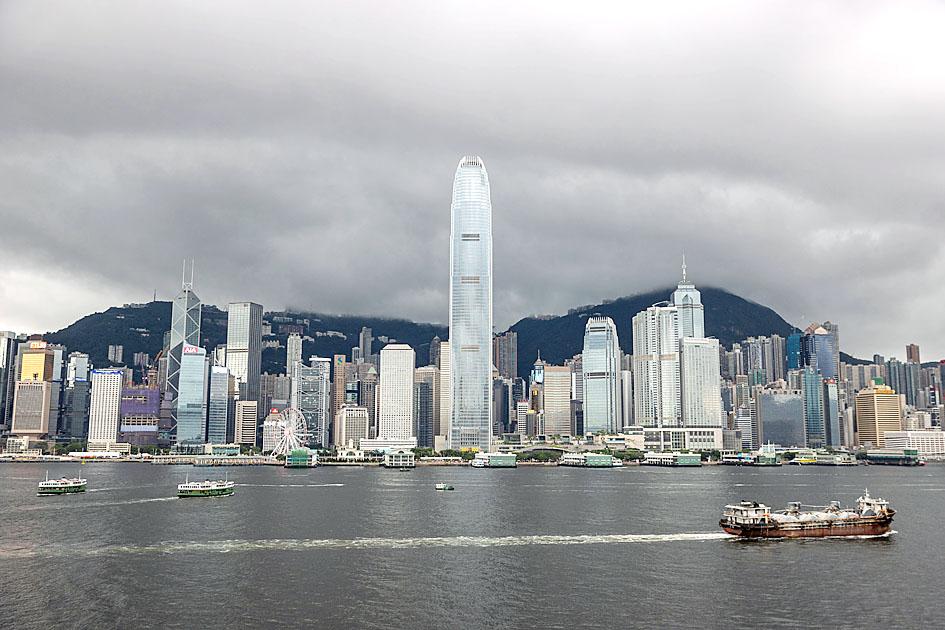Hong Kong is dusting off the gong for the territory’s first in-person listing ceremony in two years.
Logistics start-up GogoX Holdings Ltd (快狗打車) is hosting a ceremony at the exchange’s newly refurbished HKEX Connect Hall tomorrow, a media invitation said.
Attendees are required to pre-register and to declare they have taken a rapid COVID-19 antigen test the same day showing a negative result. Everyone must wear a mask.

Photo: EPA-EFE
The listing ceremony is another sign of normalcy that Hong Kong has been looking for after two years of stringent social distancing measures. The COVID-19 pandemic has reshaped dealmaking globally as meetings and due diligence go virtual because of travel restrictions.
InnoCare Pharma Ltd (諾誠健華醫藥), a Chinese biotech firm, was among the first in Hong Kong to opt for a virtual investor meeting in early 2020.
Striking a gong is a key feature of a listing ceremony in Hong Kong just like the iconic bell ringing ceremony in New York. In the Asian territory, executives usually hit the gong with mallets in red cloth, a color symbolizing good fortune and joy in Chinese culture. Since the pandemic, the gong ceremony has gone virtual.
Hong Kong’s initial public offering (IPO) market is also waiting for a big bang as inflation concerns and the war in Ukraine have slowed down activity significantly. Companies have raised about US$2.4 billion through IPOs so far this year, only a fraction of the US$26.2 billion raised during the same period last year, according to data compiled by Bloomberg.
GogoX last week held Hong Kong’s first in-person IPO press briefing in months. The start-up is also among a few companies that are set to defy the slump and test the waters.
Although it is only raising about US$86 million, the start-up has enlisted four banks as its IPO sponsors: UBS Group AG, China International Capital Corp (中國國際金融), Bocom International Holdings Co (交銀國際控股) and ABC International Holdings Ltd (農銀國際).

Merida Industry Co (美利達) has seen signs of recovery in the US and European markets this year, as customers are gradually depleting their inventories, the bicycle maker told shareholders yesterday. Given robust growth in new orders at its Taiwanese factory, coupled with its subsidiaries’ improving performance, Merida said it remains confident about the bicycle market’s prospects and expects steady growth in its core business this year. CAUTION ON CHINA However, the company must handle the Chinese market with great caution, as sales of road bikes there have declined significantly, affecting its revenue and profitability, Merida said in a statement, adding that it would

Greek tourism student Katerina quit within a month of starting work at a five-star hotel in Halkidiki, one of the country’s top destinations, because she said conditions were so dire. Beyond the bad pay, the 22-year-old said that her working and living conditions were “miserable and unacceptable.” Millions holiday in Greece every year, but its vital tourism industry is finding it harder and harder to recruit Greeks to look after them. “I was asked to work in any department of the hotel where there was a need, from service to cleaning,” said Katerina, a tourism and marketing student, who would

i Gasoline and diesel prices at fuel stations are this week to rise NT$0.1 per liter, as tensions in the Middle East pushed crude oil prices higher last week, CPC Corp, Taiwan (台灣中油) and Formosa Petrochemical Corp (台塑石化) said yesterday. International crude oil prices last week rose for the third consecutive week due to an escalating conflict between Israel and Iran, as the market is concerned that the situation in the Middle East might affect crude oil supply, CPC and Formosa said in separate statements. Front-month Brent crude oil futures — the international oil benchmark — rose 3.75 percent to settle at US$77.01

RISING: Strong exports, and life insurance companies’ efforts to manage currency risks indicates the NT dollar would eventually pass the 29 level, an expert said The New Taiwan dollar yesterday rallied to its strongest in three years amid inflows to the nation’s stock market and broad-based weakness in the US dollar. Exporter sales of the US currency and a repatriation of funds from local asset managers also played a role, said two traders, who asked not to be identified as they were not authorized to speak publicly. State-owned banks were seen buying the greenback yesterday, but only at a moderate scale, the traders said. The local currency gained 0.77 percent, outperforming almost all of its Asian peers, to close at NT$29.165 per US dollar in Taipei trading yesterday. The